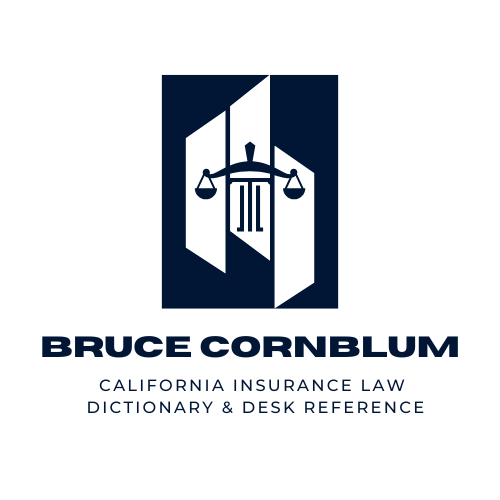California Insurance Law Office of Bruce Cornblum
Newsletter
CACI Insurance Jury Instructions: CACI 2331 “Bad Faith” First Party
Recommendations to CACI 2331 of definitions that should be added to CACI insurance jury instruction to make it understandable for the jury are discussed in this newsletter. CACI 2331, Continuing breach of the implied obligation of good faith and fair dealing – Failure or delay in payment (first party) – Essential
Is Policy Limits Demand Required to Collect Excess Verdict?
A question has long existed as to whether an insurer, in the absence of any demand or settlement offer from the third party claimant, must initiate settlement negotiations or offer its policy limits. [Reid v. Mercury Ins. (2013) 220 Cal.App.4th 262, 265] In 2013 the Reid court, discussing a personal injury case involving
COLLATERAL SOURCE RULE
“Collateral” defined An injured party after a loss may recover money from an external source. [Arambula v. Wells (1999) 72 Cal.App.4th 1006, 1009 (injured party received gratuitous payment of lost earnings)] These funds are wholly independent from, and collateral to, the tortfeasor. Insurance coverage maintained by a plaintiff is separate and
“Intentional Act” and “Deliberate Act” Distinguished
One who knowingly contemplates the “result” of his act before committing the act is committing a deliberate act. [Hogan v. Midland National Ins. Co., (1970) 3 Cal.3d 553, 560] Hogan is perhaps the most instructive opinion from the California Supreme Court distinguishing between an intentional act that is covered under a liability
Obtaining insurance coverage opinions – Liability and Property policies
In general Are you unsure whether your client’s case is covered under a liability or property policy? Is the adjuster telling you there probably is no coverage? Has your client received a denial of coverage letter? The adjuster in these circumstances is relying upon a COVERAGE OPINION written by an
Criminal Proceedings: Duty to Defend
§ C151 CRIMINAL PROCEEDINGS: DUTY TO DEFEND § C151:1 In general In 1988, the California Legislature declared that it is a violation of public policy for a policy to provide any duty to defend: (1) any claim in any criminal action or proceeding, or (2) any action or proceeding brought
TRUST — Insurer/Adjuster Honesty
§ T54.02:1 In general First party claims First party losses involve property loss and damages arising from covered risks. See § R85 RISK [§ R85:3 First party context]. The insured in general has far less skill than the trained adjuster in determining: (a) the scope of the loss (b) loss valuation,
NEGLIGENCE OF INSURER
In general Negligence of an insurer can arise as an alleged basis for liability in several different contexts. The insured (or an assignee of an insured) may contend that the insurer is liable due to the fact that an adjuster negligently handled the claims adjustment process. An insured may contend
Concealment [by Insurance Company]
In general Common law rule relating to performance of a contract It is Hornbook law that where one contracting party prevents the other’s performance of a condition precedent, the party burdened by the condition is excused from performing it, and the benefitted party’s duty of performance becomes unconditional. The law
